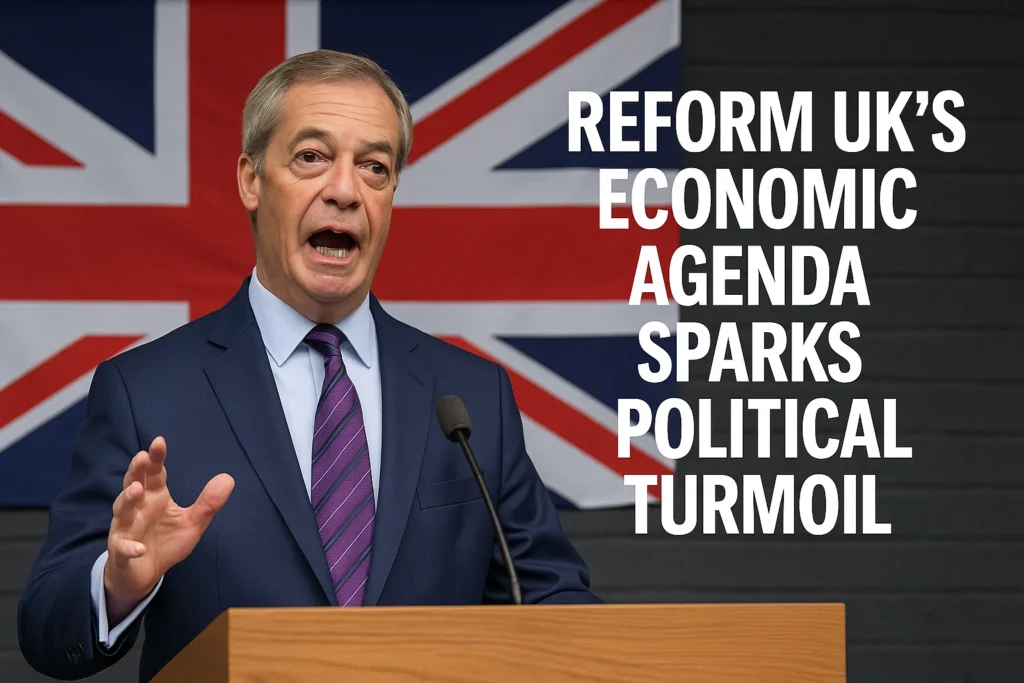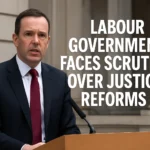Introduction: A Bold Plan for Britain’s Wallet
Imagine a government that promises to let you keep more of your hard-earned money, significantly cutting the taxes you pay. Sounds appealing, right? This is exactly the kind of bold promise that Reform UK, led by Nigel Farage, is putting forward with its new economic plan. It’s a vision that aims to shake up how Britain’s money works, from your paycheck to big national projects.
But big promises often come with big questions. While the idea of more money in your pocket is attractive, where would that money come from? And what would be the trade-offs for such a major shift? This economic agenda has quickly sparked a heated debate across the political landscape, with critics from other parties calling it “fantasy economics” and warning of potential financial instability. Let’s delve into Reform UK’s ambitious proposals, explore how they plan to pay for them, and hear why these ideas are creating such a stir.
More Money in Your Pocket? The £20,000 Tax Threshold Idea
At the heart of Reform UK’s new economic plan is a headline-grabbing proposal: raising the income tax threshold to £20,000.1 This means that if you earn less than £20,000 a year, you wouldn’t pay any income tax at all. For many working people across Britain, this could mean a noticeable boost to their take-home pay, providing welcome relief, especially during tough economic times.
What Does This Mean for Everyday People?
Currently, in the UK, you start paying income tax once your earnings go above a certain amount (the personal allowance, which is currently £12,570).2 Reform UK’s proposal would dramatically increase this allowance.3 For someone earning £20,000, it would effectively mean they keep an extra £1,486. But for people earning more, say £30,000 or £40,000, they would also benefit, as the first £20,000 of their income would be tax-free.
The idea behind this is simple: to put more money directly into the hands of working individuals and families. Supporters argue that this would stimulate the economy, as people would have more to spend, save, or invest. It’s presented as a way to ease the cost-of-living crisis and reward hard work.
The Big Price Tag
While the promise sounds good to many, there’s a huge question mark hanging over it: the cost. The Institute for Fiscal Studies (IFS), a well-respected independent research group that analyzes government spending and taxes, has looked closely at this proposal. Their estimate suggests that raising the income tax threshold to £20,000 could cost the government an enormous amount of money – somewhere between £50 billion and £80 billion per year.
To put that into perspective, £50 billion is roughly what the UK government spends on defense in a year, or a significant chunk of the entire NHS budget. This is a massive sum of money that the government would no longer collect in taxes, creating a huge hole that would need to be filled from other sources. This is where the debate gets truly intense.
How to Pay for It: Scrapping Net-Zero and Other Cuts
A bold promise like a massive tax cut requires an equally bold plan to pay for it. Nigel Farage and Reform UK have outlined specific areas where they believe the government can find the billions needed. Their strategy involves making significant cuts to areas that they argue are either too expensive, inefficient, or not a priority.
The Net-Zero Question
One of the most controversial funding ideas is scrapping net-zero policies.4 The UK has a legal commitment to reach “net-zero” carbon emissions by 2050.5 This means reducing greenhouse gas emissions as much as possible and offsetting any remaining emissions,6 with the aim of combating climate change. Achieving this requires massive investments in renewable energy, electric vehicles, insulation for homes, and new green technologies.
Reform UK argues that these policies are hugely expensive for the British taxpayer and consumer, driving up energy bills and hindering economic growth. By ending or significantly scaling back these commitments, they suggest billions could be saved.
However, critics argue that scrapping net-zero would:
- Damage the Environment: Undoing efforts to tackle climate change would have serious environmental consequences.
- Harm the Economy (Long-term): Moving away from green industries could make the UK less competitive in future global markets and miss out on job opportunities in the green sector.
- International Reputation: It could damage the UK’s standing on the world stage, as many countries are committed to similar climate goals.
This proposed cut isn’t just about money; it’s about a fundamental disagreement on environmental priorities and the future of Britain’s energy and industry.
Cutting Costs on Asylum Seekers and Diversity Programs
Beyond net-zero, Reform UK points to other areas for significant savings:
- Asylum Seekers: The government currently spends billions of pounds on processing asylum claims, housing asylum seekers, and providing support.7 Reform UK argues that by implementing stricter border controls, speeding up deportations, and making the UK less attractive to illegal immigration, these costs could be drastically cut. This proposal often connects with broader debates about immigration policy and national sovereignty.
- Diversity Programs: They also propose cutting funding for what they term “diversity programs” within public bodies. These programs are typically aimed at promoting equality, inclusion, and representation for various groups within government departments, public services, and institutions. Reform UK suggests that these programs are often wasteful or unnecessary, and that the money could be redirected. Critics argue that these programs are vital for combating discrimination and ensuring fair opportunities for all.
Together, these proposed cuts represent a significant shift in government spending priorities, moving money away from environmental initiatives, support for asylum seekers, and diversity efforts to fund the proposed income tax cut.
“Fantasy Economics”: The Criticisms Mount
As soon as Reform UK unveiled its economic plan, a chorus of criticism erupted from across the political spectrum. Opponents didn’t just disagree; they condemned the proposals as unrealistic and dangerous. The term “fantasy economics” quickly became a common label.
Warnings from Labour MPs
Labour Members of Parliament (MPs) have been among the most vocal critics. They argue that:
- Unfunded Pledges: The numbers simply don’t add up. They accuse Reform UK of making huge spending promises (tax cuts) without a credible plan to cover the cost. They question whether the proposed cuts would genuinely generate enough money to fill the £50bn-£80bn hole.
- Harmful Cuts: Labour MPs contend that scrapping net-zero policies would be disastrous for the environment and for Britain’s future economy, particularly in green industries. They also argue that cuts to support for asylum seekers and diversity programs would be socially divisive and inhumane.
- Risk to Public Services: They warn that if the proposed cuts don’t cover the tax reduction, other vital public services like the National Health Service (NHS), schools, or police could face devastating cuts to make up the difference, leading to a decline in quality of life for ordinary Britons.
Green Party Outrage
Leaders from the Green Party have been particularly outraged by the proposal to scrap net-zero policies. Their arguments focus on:
- Climate Catastrophe: They emphasize the urgency of the climate crisis and warn that abandoning net-zero commitments would accelerate environmental damage and place the UK on the wrong side of history.
- Lost Opportunity: They argue that the green economy is a massive opportunity for new jobs and industries, and that scrapping these policies would be a huge self-inflicted wound to Britain’s economic future.
- Moral Responsibility: The Greens highlight the moral duty to protect the planet for future generations, irrespective of short-term financial debates.
This strong backlash underscores how deeply divided political parties are on the future direction of the UK’s economy and its values.
Echoes of the Past: Warnings of Financial Instability
Perhaps the most serious accusation leveled against Reform UK’s economic plan is the warning of potential financial instability. Critics suggest that such an unfunded or drastically funded tax cut could lead to chaos in the markets, reminiscent of past economic missteps.
The “Mini-Budget” Reminder
Many critics immediately drew parallels to a recent, controversial event in UK economic history: the 2022 “mini-budget.” During that period, a previous government proposed significant unfunded tax cuts, which led to:
- Market Panic: Financial markets reacted with alarm, fearing that the government would have to borrow huge amounts of money, making the UK’s debt unsustainable.
- Soaring Interest Rates: The cost of government borrowing shot up, which in turn caused mortgage rates to skyrocket for homeowners, adding huge financial pressure to families.
- Plummeting Pound: The value of the British pound against other currencies fell dramatically, making imports more expensive and contributing to inflation.
- Political Turmoil: The economic fallout was so severe that it led to the rapid resignation of the Prime Minister and Finance Minister.
Critics of Reform UK’s plan fear that a similar situation could unfold. The Institute for Fiscal Studies, in its analysis, isn’t just counting the cost; it’s also implicitly warning about the economic risks of such a large, potentially unfunded, tax reduction. The concern is that if financial markets don’t believe the numbers add up, or if the proposed cuts are seen as too damaging, investors might lose confidence in the UK economy. This lack of confidence can lead to higher borrowing costs for the government, businesses, and everyday people, potentially throwing the country into economic turmoil.
The warnings aren’t just political jabs; they reflect genuine concerns from economic experts about the potential for market reaction to drastic, uncosted, or poorly explained fiscal policies.
The Core Debate: Taxes, Spending, and Priorities
At its heart, Reform UK’s economic agenda sparks a fundamental debate about taxes, government spending, and the priorities of a nation.8 It forces a conversation about difficult choices and trade-offs.
The Economic Philosophy at Play
- Lower Taxes for Growth: Reform UK’s approach is rooted in the belief that lower taxes encourage people to work harder, businesses to invest more, and ultimately lead to a stronger economy. This is a common argument from those on the right of the political spectrum.
- Fiscal Responsibility (Their View): They argue that their proposed cuts are necessary to bring government spending under control and remove what they see as wasteful expenditure.
- Targeted Spending vs. Universal Benefit: Their plan shifts money from specific government programs (like net-zero initiatives or diversity projects) towards a broader tax cut that benefits many individuals.
The Clash of Values
However, other parties and critics highlight different values:
- Collective Good: Arguments for net-zero and diversity programs often emphasize the collective good – protecting the planet for everyone, or ensuring fairness and equal opportunities for all members of society.
- Strong Public Services: Many believe that taxes are necessary to fund robust public services like healthcare, education, and social safety nets, and that drastic cuts could harm these essential services.
- Social Cohesion: Critics of cuts to diversity programs argue they are essential for social cohesion and preventing discrimination.
The political turmoil surrounding this plan isn’t just about numbers; it’s about competing visions for what kind of society Britain should be and how its money should be managed to achieve that vision.
Conclusion: A Plan That Divides and Demands Answers
Reform UK’s unveiling of its economic agenda, with its central promise to raise the income tax threshold to £20,000, has undeniably injected a potent dose of controversy into British politics. Leader Nigel Farage’s proposed funding mechanisms – particularly the dramatic shift away from net-zero policies and significant cuts to asylum seeker and diversity programs – have ignited a passionate and fierce debate.9
The bold claims about freeing up billions of pounds are met with equally strong warnings from the Institute for Fiscal Studies, which estimates the cost at a staggering £50bn-£80bn.10 Critics, including prominent Labour MPs and Green Party leaders, have been quick to label the plan as “fantasy economics,” drawing unsettling comparisons to past periods of financial instability.11
This economic blueprint forces the nation to confront tough questions about its priorities: How much is a tax cut worth? What are the true costs of environmental commitments? And how should a society balance economic ambition with social responsibility and public confidence? The debate is far from over, and as Britain heads towards future elections, Reform UK’s plan will undoubtedly remain a central point of contention, demanding clear answers and a careful weighing of its potential impacts.



